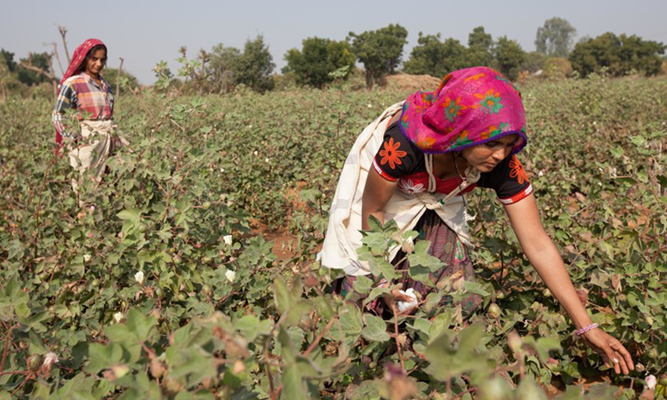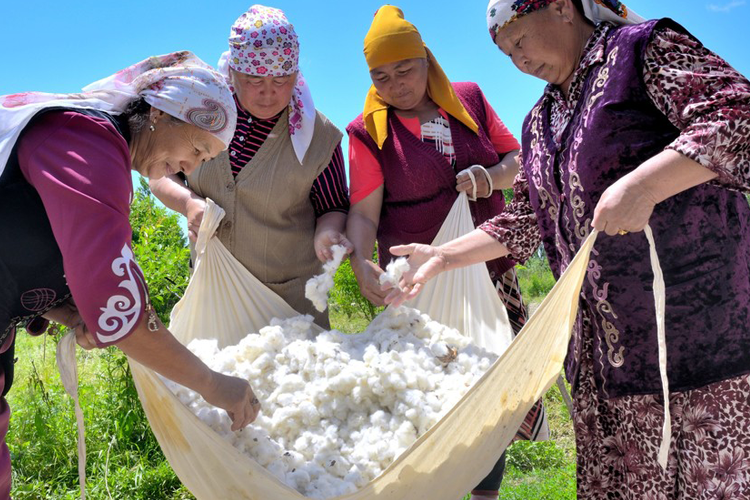by Subindu Gharkel, Senior Cotton and Textiles Lead at Fairtrade Foundation
As the world faces the Coronavirus pandemic as one, we at Fairtrade are focusing on how the rapidly evolving crisis is affecting the farmers and workers who produce many of our favourite goods, including our most treasured outfits and our everyday clothes.
With retailers globally shutting their doors and customers facing the uncertain future of being furloughed or laid off, fashion and buying new clothes are beginning to feel like the last thing on the long list of our new priorities.
And whilst a few brands and retailers have begun to ingeniously shift their manufacturing efforts to produce masks, protective gear and other goods needed in the health care industry as part of their crisis response strategy, there has also been growing recognition of the toll that store closures and order cancellations is taking on the workers across the fashion value chain on a global level.
While most businesses are either cancelling in-production orders, or (as reports suggest) delaying payments ‘indefinitely’, some loud and well targeted public campaigning efforts have seen some businesses publicly confirming they’re willing to receive and pay for orders already placed. Others have announced the creation of a fund to pay supply chain workers, but questions remain over some of the detail about which stage of the production of clothing this will cover. There are also unanswered questions about timelines.
What concerns me is that much of the international narrative on this crisis to date has overlooked many of the other very significant links within the fashion supply chain, despite their role being integral to the making of a dress or a pair of jeans, beautiful or ordinary.
I’m referring to the cotton farmers, the ginners and spinners who are so often forgotten in the fashion debate and continue to be so in the face of this pandemic. I’m also talking about some of the most vulnerable people: migrant workers and seasonal workers and their communities.

As brands announce the cancellation of $2 billion worth of current orders in Bangladesh alone, and there’s no clarity of future orders being placed, the effects will inevitably be felt by everyone. With no cash flowing down the supply chain in the face of this unexpected halt in manufacturing, it is the most vulnerable, lowest paid people that will feel the worst effects and there is a real threat of food insecurity and worse to come for many.
At Fairtrade, cotton farmers are looking to the longer term and considering whether to divert land to producing food. We are between two cotton crop seasons at the time of writing, and most farmers have already sold 80-90 percent of their production from the last season before the lockdown. This means they are not seeing the immediate impacts of factory closures and cancelled orders yet, but are expecting it to arrive with full force in the autumn. In Africa, there are already signs that cotton prices are falling and there are forecasts of global cotton prices dropping by 22 percent this year.
We’re bracing ourselves for delays in payments and lack of cash flow as the inevitable knock on effect ripples down the supply chain. There is also the worry at the back of our minds posed by the threat of changing supply chains and near shoring.
I am in regular contact with our cotton farmers through colleagues on the ground, we are working hard to evaluate the short, medium and long term impacts and designing possible interventions and solutions to help our farmers. Fairtrade has already introduced flexibility in the process and use of the Fairtrade Premium so that producers can use it to manage financial risk during the pandemic. We will know more when the new crop season starts, but until then, I’d like us to advocate for more government measures to ensure supply chain relationships, orders, payments and other obligations are met. Unless cash flows through the supply chain, workers will not get their wages and farmers will miss out on a fair price for their crops.
My message to the fashion industry is this: please continue to support your direct suppliers and foster these partnerships. You can be instrumental in elevating the supply chain to a virtuous chain of support and solidarity. The people at the start of the chain are relying on your support.
The lesson that Coronavirus is rapidly teaching us is that we are all in it together, we are connected by the same narrative thread, one global community, no matter who or where we are.
